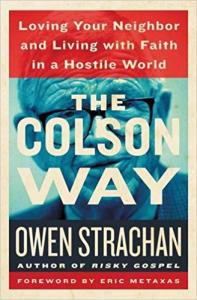 The biography of James Stoner, the conference’s third speaker:
The biography of James Stoner, the conference’s third speaker:
“Professor James R. Stoner, Jr. has teaching and research interests in political theory, English common law, and American constitutionalism. He is the author of Common-Law Liberty: Rethinking American Constitutionalism (Kansas, 2003) and Common Law and Liberal Theory: Coke, Hobbes, and the Origins of American Constitutionalism (Kansas, 1992), as well as a number of articles and essays.
In 2002-03 he was a visiting fellow in the James Madison Program in American Ideals and Institutions at Princeton University. He served from 2002 to 2006 on the National Council on the Humanities, to which he was appointed by President Bush.”
University. He served from 2002 to 2006 on the National Council on the Humanities, to which he was appointed by President Bush.”
The following are the weighty remarks of Stoner from “Politics and Moral Culture: Aristotle, Rawls, and George.” I would encourage readers to brush up a bit on the philosopher John Rawls before reading. This talk was aimed at political philosophers and thus might be a bit more difficult to understand than others. For my part, I will withhold personal comment on this and other talks oriented more to political philosophy.
Have you ever had a favorite product that was dropped by its manufacturer, a favorite restaurant that was closed, a favorite song that fell off the charts and so off the playlist? This is rather the way I felt when I discovered that, in revising his political philosophy, John Rawls effectively discarded what he had called in The Theory of Justice the “Aristotelian Principle.” Indeed, it seems to me that the Aristotelian Principle was not an afterthought or a dispensable feature of Rawls’ celebrated theory, but essential to its integrity and its plausibility.
A Rights-Based Theory of Justice
Rawls elaborates the outlines of his theory in the first part of A Theory of Justice, and in the second he shows how it effectively reproduces American constitutionalism, at least in an age of a vigilant liberal judiciary. In the third and final part, Rawls undertakes to show that the society built upon such a theory could be stable and successful.
The Aristotelian Principle
Key to the argument is what he termed the Aristotelian Principle and defined as follows: “other things equal, human beings enjoy the exercise of their realized capacities (their innate or trained abilities), and this enjoyment increases the more the capacity is realized, or the greater its complexity.”
Barely a decade after the celebrated Locke scholar Peter Laslett pronounced political philosophy to be dead, Rawls published to great acclaim his synthetic account of a liberal philosophy of justice. Incorporating social science and game theory as well as psychology and other branches of learning, Rawls revived the notion of a social contract to develop a rights-based philosophy of justice that aimed at once to capture the basic moral intuitions shared in liberal democracies and to formulate these in such a way as to structure a course of reasoning that would settle controversies and provide not only a platform for political reform but an underlying constitutional doctrine that might define the outer boundaries of political dispute.
Stoner then made three observations about Rawls’s use of the Aristotelian Principle in A Theory of Justice. First, as I said at the outset, I think that Rawls’s account of the Aristotelian Principle, and particularly of its companion effect, observing that we often find our own inchoate capacities fulfilled through others so that we can identify with others and so feel ourselves a part of society as a whole and appreciative of the justice that binds it together, rings true to experience.
Second, Rawls overstates or misinterprets what he calls “the acceptance of democracy in the assessment of one another’s excellences.” The development of any talent requires initiative on the part of the person, and that is one reason why people on the whole have the right to make their own choices about how to live and why they experience the very act of choosing as a good; but development requires counsel and guidance, and to the extent that Rawls discourages these, I think he errs. Third, the companion effect of the Aristotelian Principle makes sense of the assumption embedded in the original position that persons can be imagined apart from their personal capacities, that, in other words, they do not own their talents in the same way that they own their basic liberties; there is a social dimension to the talent pool.
Rawls’s notion of reflective equilibrium, if individuals can be persuaded that their own talents and those of others are best developed in a just society as he describes it, they might agree to cede their natural claim of right to their own gifts, or rather, to their natural reward, as the original position demands. At least it makes Rawls’s theory itself coherent and plausible, and the sharing in one another’s talents captured by the Aristotelian Principle allowed a Rawlsian to critique a libertarian theory that gives individuals absolute ownership of everything about themselves.
Justice No Longer Right and Good
When Rawls rewrote his theory of justice in Political Liberalism, however, he abandoned the effort made originally in part three of A Theory of Justice to show that justice as fairness is not only right, but good. Whereas justice as fairness was defended in A Theory of Justice as such a comprehensive doctrine – precisely the point of part three was to prove its comprehensiveness – Rawls now retreats to offering justice as fairness as a kind of meta-doctrine, able in theory to attract more adherents because it claims only to go as far as the overlapping consensus on right, without making the further claim to be not only right, but also good.
The key concept of the revised theory, which Rawls calls “political liberalism,” is the notion of public reason: In their debates over “‘constitutional essentials’ and questions of basic justice,” citizens cannot appeal “to the whole truth as they see it” but only to such arguments as can be made “in terms each could reasonably expect that others might endorse as consistent with their freedom and equality.”
In the second place, Rawls’s move toward political liberalism betrays not so much his discovery of pluralism as his loss of faith in the Aristotelian Principle. In other words, if a society where individuals have different life plans might nevertheless come to appreciate the differences and recognize a basis for stability even in their very disagreements, why is stability impossible where (comprehensive) liberals, Catholics, Evangelical Christians, and Jews can work out political solutions while respecting one another’s differences and even seeing in the differences an intimation of transcendent good?
Conclusion
I suggested at the outset that, if John Rawls has abandoned the Aristotelian Principle, as I now have shown he has, perhaps the concept could be adopted by Professor George and used to help construct a defense of law and legislation that protects public morality. As Robert George has shown in Making Men Moral, the case for public morality does not require universal application, only widespread need. The Aristotelian Principle shows that human beings are happier the more they exercise their capacities, and the more complex their exercises.
Two Criticisms of Political Liberalism
I want to level two related criticisms at the idea of political liberalism itself. In the first place, while Rawls is correct to think that those who hold incompatible comprehensive doctrines can live together in peace only through political agreement, he errs to think that a philosophy based on an overlapping consensus is the only or the soundest source of such agreement. To try to substitute philosophy for politics is apt to confuse the one for the other, either substituting a political program for the philosophic quest – while perhaps not acknowledging that one has done so – or by imposing philosophic censorship on real political debate.
Is it not a corollary, then, that the road to misery comes from their enervation and reduction? And cannot most offenses against public morals, precisely because they are self-destructive, be shown to be one or the other of these?
Afterward
Jack Nowlin, professor of constitutional law at the University of Mississippi, responded for about fifteen minutes to Stoner’s talk. Nowlin’s response was followed by a question-and-answer session that included discussion about liberalism, Rawls’s conception of sin, where George falls on the philosophical spectrum related to Rawls, and more.















